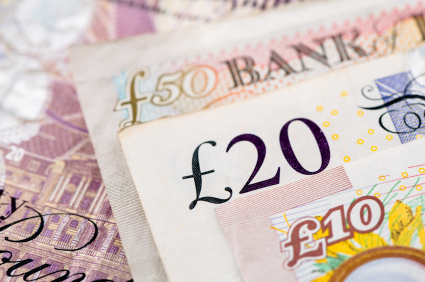Monthly Saving Tips for 2013
Have you decided to cut your spending this year, or at least get your money working for you as hard as it possibly can? If so, here is a handy month by month guide to how you can take control of your cash for good.

JANUARY
With the resolve of the New Year to motivate you, now is the time to start thinking about one of your biggest expenses; the mortgage. You may not think so at first, but providing you are on your lender's standard variable rate you will probably be able to reduce your mortgage by shopping around. And better still, for each 1% reduction on £100,000 you can secure, you will save around £60 - £80 a month in cash. Also bear in mind that if you have any savings available it may be worth overpaying your mortgage. Even overpaying by fifty pounds a month will cut the term of the mortgage and potentially save you thousands in interest.
Secondly, with the ever present inclement weather to remind you, January is also the ideal time to take a careful look at you fuel bills. Switching your utilities from a provider's standard dual fuel rate can typically save you £250 a year. Some of the lowest rates are also fixed for up to two years which should provide a sense of security in terms of your budget. Fixing your prices doesn't mean you are necessarily stuck in a contract if prices drop; several of the current two year fixes do not have any exit fees if you choose to change to another supplier.
FEBRUARY
February is often a month when we need to face up to the overspending of the festive season and get to grips with those credit card bills. Credit cards are often the most expensive form of debt that we have - certainly if you can't clear the balance.

One option, if you are not intending to spend any further, would be to swap to a card which has a 0% balance transfer offer. On a balance of £2,200 on a card charging 15.9% apr, the interest over three years would amount to over £540 - money you could put towards paying off your actual debt on a 0% card.
A word of warning though; these cards can have high rates for any purchase you make on them so if you are intending to make future purchases then other cards may be more suitable. Alternatively, if you do pay your balance off in full each month, then you may want to look at a cash back card which will pay 1 -2% back on your purchases.
In February, one of the major expenses can often be Valentine's Day - but remember, it doesn't have to be expensive to be romantic. Cheap Valentine's Day ideas can include each or any of the following; writing a love letter, making handmade coupons for gifts such as a massage or a meal to be cooked at home, or making a compilation CD of your favourite songs. If you do decide to buy your partner something, go through a Cashback site such as Quidco to get a little something back on what you spend.
MARCH
March is a month for spring cleaning our home, so it is a good idea to have a financial spring clean to see how we can save money around the house too.
Ideas to save money on your home products include shifting down a brand, so try using a store's own label as opposed to a recognised brand and see if you notice a difference. Also consider switching your conventional light bulbs to low energy bulbs as these often use 60% less energy.
Finally, look out for coupons in newspapers or online for goods that you buy, and make sure you have registered for loyalty schemes such as Nectar or Tesco Clubcard. Individually, each of these steps may only save a few pounds a month, but added together this can amount to significant savings over the course of a year and beyond.
It's also a good idea to have spring clean of your paperwork. Knowing where bills and receipts are stored and when payments are due can help in a number of ways. Firstly, you are less likely to be charged an extra amount for late payment, and you will be able to claim for any goods that develop a fault. Also, you can use your paperwork to help you develop a budget to help you compare your spending to see if you are on track or not. If not, work out which areas you are overspending on and take action accordingly.
APRIL
With April comes the warmer weather and the Easter holidays. So, if you have children, it can sometimes be expensive to keep them entertained. However, there are a number of inexpensive ways you can entertain the children and still see they get out and about, such as going for walks or playing in the park and taking a picnic - which negates the need for buying expensive snacks. Or, if the weather does turn, you could always break out the board games; a classic such as Monopoly can provide hours of free entertainment for the young and not so young alike.

Involving the kids in the preparation of their meals can be great fun, especially for the under twelves, or even have a duvet day where you invest in some cheap snacks such as popcorn and everyone gets to pick a movie you can all watch. However, if you are planning a day trip, there are a few simple tips you can follow which will help cut the cost of your petrol - always a major expense. Indeed, it is possible to slash your bill by a third.
Firstly, make sure your car is operating at its highest level of efficiency. Inflating tyres reduces petrol consumption by 3%, removing the roof rack by 2%, clearing out clutter from the boot by up to 2%, and turning off the air con when it isn't needed by up to 8%. Once you have done that, use one of the comparison websites to find the lowest petrol prices in your area. Prices can vary by around five pence a litre - which on a £50 per week fuel spend amounts to a saving in the region of £100 a year.
MAY
In May our water usage really starts to rise as paddling pools start to come out and gardens may begin to need the hosepipe. Unlike with other utilities, you can't switch your water provider but there are still ways you can make savings.
Firstly, it is often cheaper to switch to a water meter where you will be billed on how much water you use as opposed to a flat rate. When working out if this will be the best option for you, the general rule of thumb is that if you have more bedrooms in your house than people then you should get a meter. However, for a more accurate assessment, take a look at the calculator on the Consumer Council for Water website.
If you are already on a meter, then there are a number of ways to reduce the amount of water you use. Most water companies offer a number of free water saving gadgets such as more efficient shower heads, flush savers and shower timers. As well as investing in these, you should also look at changing your habits; use mulch in the garden to reduce the need for watering, don't leave taps running when you are brushing your teeth, clean your car using a bucket not a hosepipe, steam your vegetables instead of boiling them, investing in a dual flush loo, fix any leaky taps and look to buy water efficient white goods.
JUNE
In June you will be halfway through your money saving year, so it is time to celebrate what you have achieved and see what further habits you could introduce.
One good idea is to make the most of the nicer weather and walk or cycle to work if possible, or use the car less at the weekends. Even if you can't cycle or walk the whole way, think about getting off one stop earlier on public transport which will cut your costs and improve your health.

If you are interested in taking up cycling, then check if your employer runs a tax free cycle scheme. Many business do run this government backed scheme which allows you to purchase a bike and pay for it out of your pre tax income with the payments being spread over the year. Depending on your tax rate, it may save you up to 40% on the cost of a new bike. Also, while you are checking this out, see what other benefits you get from your employer that you may have forgotten about. Many offer schemes such as healthcare cash plans which entitle you and family to free dental and optical care up to a certain limit each year. If you are a member of any professional body, remember to let the tax office know as they will add this to your tax code as any relevant subscriptions are tax deductible.
JULY
By July, you should ideally have started feeling the benefit of all the above, both in terms of your personal finance and your health. But there are still further ways you can save money and improve on your health as well.
The big one, of course, is giving up smoking. Indeed, this may well turn out to be the best decision you ever make. If you smoke 20 a day, then giving up can save over £2,000 a year - and the health benefits are numerous.
Other health and fitness money saving tips include giving up your gym membership and looking instead for free exercise opportunities such as running in a local park. If you really prefer using gym equipment, then look at switching to a council owned facility as these are often half the price of private gyms.
If you have any ongoing illnesses, look to invest in a prepayment prescription certificate as these will cut the costs of your prescription charges by about a third. Your local chemist or GP will be able to give you advice about these. Think about cutting down on your drinking too as this can also save hundreds of pounds a year.
For those times you do want to socialise, invite friends over to your house instead of going out. Getting people together for a weekend barbeque where everyone brings a bottle and a dish will work out significantly cheaper than going to a local restaurant, and as most people like to save money, your friends will probably be glad of the change too. Alternatively, think about running a Come Dine with Me style event where you all take it in turns to host dinner.
AUGUST
This is still the month where the majority of people like to go away, and there are plenty of money saving opportunities available when it comes to holidays. Don't just walk into a travel agents and purchase a package holiday; think about putting your own holiday together online instead.

By purchasing the flights, accommodation and car hire separately, people are often able to save hundreds of pounds. To help cut the cost of flights, consider flying at less popular times such as mid week or a late night/early morning flight as these tend to be much cheaper. If you can manage to cope with only hand luggage and don't opt for pre-booking your seats on the plane, this will cut your costs even further. This also has the advantage of avoiding lengthy baggage reclaim queues at the airport.
Before you go, shop around for travel insurance as this can be found very cheaply online, but before you purchase it do check with your bank as several providers offer free travel insurance as part of their current account packages.
Lastly, before you set off, check which is the cheapest place to get your currency. Using your card abroad is almost always the most expensive option (alongside purchase at the airport) so pre-order your currency in plenty of time. If you are going to use your card abroad, choose a provider such as Nationwide which does not charge a transaction fee on usage overseas.
SEPTEMBER
After the excitement of the summer months, this is when everyone returns to work or school. If your children are not yet in school and you pay for childcare, then you can save hundreds each year by paying through childcare vouchers. This is a government scheme which is operated by employers which lets you pay for your childcare from your pre-tax salary. The scheme usually works through a salary sacrifice, where you exchange £1,000 of your salary, which after tax and NI is usually worth around £700 to you, for £1000 of vouchers to spend on childcare, meaning you are £300 better off.
There is limit of £55 worth of vouchers per week per parent, so for a basic rate tax payer this is a saving of £930. For higher rate taxpayers, the limit is lower at £28 per week, but this still amounts to a healthy saving of £620 per year.
September is also a good time to start thinking about Christmas. It may seem a long time away, but failure to plan can have a really negative effect on you finances. Putting away something each month from September to cover the costs of the festive season can help you avoid having to build up that costly credit card debt to be dealt with in the New Year. In fact, keeping your eye out for gifts from this time onwards can help you pick up any bargains, thereby reducing the cost of Christmas overall.
OCTOBER
As the nights start to draw in and children start preparing for Halloween, the most important money saving task is to start preparing yourself and your home for winter. Simple tips such as investing in a draft excluder, ensuring your curtains are lined and checking your radiators don't need bleeding can help your fuel efficiency in the coming months. Remember that if you are over a certain age, you can claim winter fuel payments to help towards bills too.
During October, when many of us start to turn to comfort food such as stews and casseroles, it might be a good idea to think about batch cooking which just means cooking double what you need and putting some in the freezer. This means that you always have spare meals available and will therefore be less tempted to order expensive takeaways on those nights when you are feeling exhausted.

Investing in a slow cooker can help reduce your food costs as these machines are designed to cook meat and vegetables at a low temperature for up to 10 hours, meaning you can create delicious dishes of the cheaper, tougher cuts of meat such as stewing steak. Additionally, while you are doing all this cooking, why not think about taking your own lunch to work? Buying a sandwich and a drink every day can cost £15 - £25 a week, whereas a tasty and nutritious soup can be whipped up at home in a matter of minutes for a few pence a day. When it comes to Halloween, consider making homemade treats such as caramel popcorn or witch hat cookies.
NOVEMBER
As the year starts to draw to an end, the party season begins in earnest and there are a number of money saving tips to make sure you are looking your best for those festive dos.
First check if your local college runs a health and beauty course or a hairdressing qualification. If so, you may well be able to get your hair cut for under £10 and treatments such as eyebrow waxing for significantly less. Course tutors will always be around supervising, so you shouldn't end up with a bad cut - it's simply likely to take quite a bit longer.
Alternatively, think about having a spa day at home. Investing in a few candles and products means you will be able to give yourself the full works for a fraction of the price of an expensive spa. You may even be interested in making your own beauty products which are also much softer on the skin than many cosmetics. Possibilities include machining your own cleanser from Kaolin clay which you can buy online, making exfoliaters from oil and sugar, face packs from oats and kaolin, moisturisers from avocados, conditioner from beer or eggs, or bath treatments from oats and aromatherapy oils. Or you could swap to the oil cleansing method which requires nothing more than oil and a hot flannel to clean your face.
DECEMBER
The first step for a financially successful Christmas is to write a budget and stick to it. After that, there are a number of tips which can help you cut the cost, including discussing Christmas in advance with other adults in the family and agreeing a limit for the price of gifts or even buying gifts just for children.

If you are buying a gift, make sure you use an online comparison site to ensure you are getting the best price for anything you purchase. Cut the cost of staying in touch with people by using a service such as Skype to call for free and make sure you don't miss the postage deadline for second class stamps. For some free fun for the children, you can track Santa as he travels round the world for free on the Norad website.
If you give gifts at work, why not suggest a Secret Santa with a set budget? That way you are only buying for one person in the office. If you have family coming over for the big day, ask everyone to bring a contribution to the Christmas meal.
After all this, you can start thinking about New Year's Eve. Most cities have some sort of free celebration going on, so check your council's website for what's available in your area. After a whole year of being financially savvy, you should enter 2014 in a much better position, but remember to keep those frugal habits up so you don't fall back into those money wasting ways that you had in previous years.

